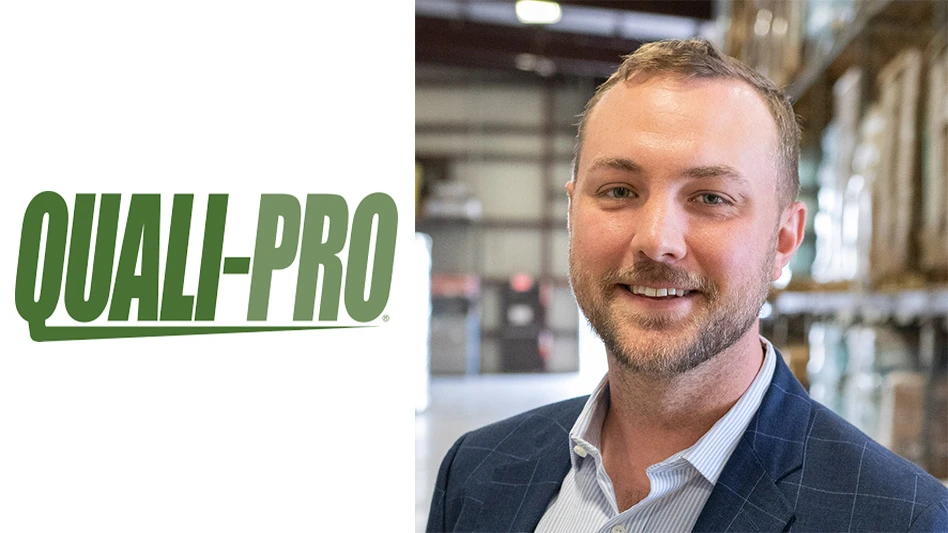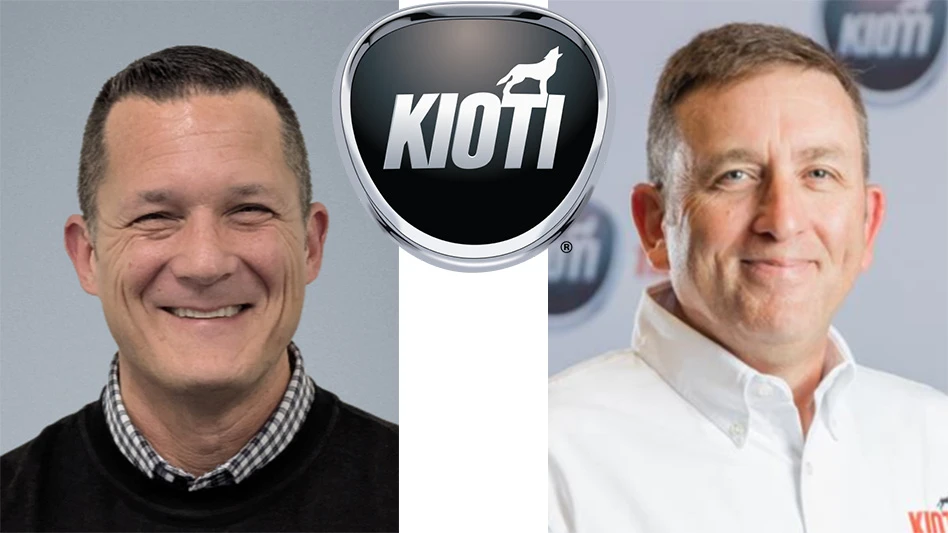Story and photos by Trent Bouts

To suggest Tim Busek clawed his way to the top from the bottom of the barrel would be inaccurate. It wasn’t a barrel. It was a Dumpster. And Busek found himself in it, down amongst the detritus, trying to fix a jammed lid.
He was a man immersed in his own metaphor.
“In that moment, I knew that obviously something was not working, and it wasn’t just the Dumpster,” he says. “It was my life.”
Taking care of that Dumpster and landscaping at an apartment complex was how Busek was getting by, after “basically being asked to leave” Columbus State University six months earlier. With five drinking-related arrests to that point and not yet 21, he’d spent 10 days in jail and performed 200 hours of community service.
“I was one of those guys in an orange vest you see picking up trash on the side of the road,” he says.
Last fall, Tim Busek joined a select group when he became president of the Georgia GCSA. Since 2005, he has been golf course superintendent at The Manor Golf and Country Club, a Tom Watson-designed course, in a subdivision in Milton, outside Atlanta, where homes sell for as much as $4 million. When ClubCorp took on The Manor with the purchase of Sequoia Golf in 2014, he became a regional superintendent responsible for five courses.
ClubCorp regards him as an “all-star,” presenting him an award with that very title in 2018. “Tim Busek … continues to deliver to our members some of the best golf course conditions in the Atlanta market,” a company statement read. “He is an inspirational and humble leader to his team and encourages them to exceed expectations daily.”
Busek’s first step toward those heights was to climb out of that Dumpster, go to the house he shared with a “bunch of professional partiers,” empty all he owned out of a single chest of drawers into his truck and drive to his parents’ home in Marietta.
“I didn’t tell them I was coming or anything,” he says. “When my dad came home, he asked what was going on. I told him and he walked upstairs and came right back downstairs with the want ads and said, ‘You’ve got 24 hours to find a job or I’ll find one for you.’ I think he was serious. He worked at a trucking company. So, I was going be loading or unloading trucks and I didn’t really want to do that.”
The next day, Busek interviewed for a laborer’s position with Kurt Russell, then assistant superintendent to Mark Esoda, CGCS, at Atlanta Country Club. “I was pruning bushes and laying pine straw,” Busek says. “The bottom of the ladder.”
It was just as well he was on the bottom rung and didn’t have far to fall because Busek was still drinking. When he was arrested, yet again, he finally took the biggest step, not just of his career, but of his life. He enrolled in a treatment program.
“At that point I started taking it seriously in an effort to turn my life around,” he says. “The first thing I had to do was stop taking advice from myself and start listening to other people. People with addictions and mental illness, they are in the same boat because your brain is wired to tell you that you are OK, that you can do this. It’s just a repetitive pattern. I would try and fix myself every day but end up in the same condition. I had to fire myself as my chief information officer.”
Today, Busek says without hesitation: “I am a recovering alcoholic, with 21 years of recovery.” Remarkably, he also makes that statement without regret. “The worst experiences of your life, whether that’s getting arrested, being in an orange jumpsuit, picking up trash on the side of the road, going to the funeral of a friend who overdosed, those are the greatest assets that I have,” he says. “Those were things that had to happen for me to get where I am today.”
That funeral was for a college roommate. Another died in a drunk-driving accident. Busek’s first wife, who he met in the treatment program, and the mother of his son, Jacob, 19, and daughter, Jillian, 13, relapsed several times. Eventually, she died of a drug overdose. They divorced some years earlier but with shared custody of his children suddenly becoming full-time, Busek considered resigning the seat on the Georgia GCSA board he’d been elected to just months before.
By now though, Busek was remarried and his new wife, Ginger, was emphatic. “Immediately, she said, ‘No. Don’t do that. We got this,’” Busek recalls. She was one more in a long and still growing line of people he says have had his back, including some who had it before he had his own.
“I had a very tumultuous relationship with my parents,” Busek says. “To be honest, the only reason I went to college was to get away from parents who were ‘horrible’ for loving me and caring about me and not wanting me to carry on with the lifestyle that I had.”
He spent two years at Winthrop University in South Carolina on a baseball scholarship but was drinking daily. “I thought to myself that if I changed colleges, I’d change my behavior,” he says. “That certainly wasn’t the case.” There was no change despite the move partly because Busek was still chained to one of the catalysts for his drinking in the first place.
“I was horribly shy,” he says. “And overcoming that shyness, speaking in front of others, introducing myself to others, doing all those kinds of things sober, was extremely difficult.”
In time, Esoda’s emphasis on being involved in the Georgia GCSA was instrumental in Busek building confidence. “Mark allowing me to go to pretty much any meeting or seminar I wanted to attend and introducing me to people was huge,” he says. “Not just professionally, but personally. I learned so many valuable lessons from Mark. I owe him. Such a good guide and leader and mentor to me. I could write a whole book on things I learned from him that helped me turn my life around.”
Esoda, a Georgia Golf Hall of Famer, was Georgia GCSA president at the time, deeply vested in a career Busek never knew existed. After all, he was a catcher, not a golfer. In the handful of times he’d swung a club up to that point, he admits he was one those guys who thinks golf courses “magically grow and mow themselves.”
As the appeal of the job took hold, so did sobriety. Busek had moved from landscaping to the golf course maintenance crew and “just really fell in love” with every aspect of his role. “It didn’t matter what they asked me to do,” he says. “I loved going to work.”

Early in his third year, he was promoted to spray technician and Busek was as shocked as he was thrilled. “I couldn’t believe someone was giving me the key to the chemical room, and going to trust me with this job,” he says. That someone did was a catalyst for Busek to discover a new level of belief in himself.
And the someone who did could hardly have been more impressed. “He was one of those guys as a spray tech who took control of his position,” Esoda says. “He made sure equipment was taken care of, made sure he had the right stuff in inventory, he took control of his budget. He took ownership of the position and that’s rare. He was the same as the irrigation guy. There is only one way to do it and that is dig the hole. People look for opportunities not to dig the hole. Tim was like, ‘I gotta dig the hole.’ And he would.”
Even as Busek grew in the job, occasional doubt crept in, doubt that he could go no further without a formal turfgrass education. But Esoda always checked him. “He would always challenge me and say, ‘Well, go get one,’” Busek says. “Or, ‘Who says you can’t become a superintendent because you don’t have an education? Show me where it says that.’”
As Busek went to more meetings, met more people, took more seminars, those doubts were swept away by determination. When he became superintendent at The Manor there were still nine holes to grow in. The golf course and the superintendent were both new to it all when the economy tanked a couple of years later. What was a $1.6 million budget and a staff of 20 dwindled to $600,000 and eight.
But as green as he may have been professionally, Busek was in a good place to deal with the stress that kind of contraction can induce. He still attends weekly meetings with his program. He has a sponsor and is in daily communication with other alcoholics.
“So long as I stay in the program and keep my connection with my higher power, as things happen through the day, my instinct is to make wise decisions,” he says. “For lack of a better term, I have created a kind of scale for what really is a big deal. If it isn’t a death, serious injury, loss of a job or divorce, it’s just really not that big of a deal. Whatever other challenges we face in a day … if I stay focused and grounded, I can come up with a solution to get through. I’m always going to try and find the bright side in whatever the situation is.”
In that vein, Busek remembers the Great Recession as a valuable, positive, experience. Golfers’ expectations didn’t change because he had fewer resources. To bridge that gap, Busek drew on a mantra he heard time and again from Esoda.
“One of Mark’s biggest things was, ‘You’ve got to find a way!’ And, really, for me professionally, as hard as the work was, it was a tremendous lesson in what you can and cannot do,” he says. “I got to a point where I was not afraid to take calculated risks and try different things to maximize the staff that we had in the time that we had to do things.”
Many coaches preach to athletes that they can “only control the controllables.” And while Busek did all he could to “control” the golf course, he was constantly vulnerable to events away from it. “We had quite a wild ride,” he says. “In my 14 years here, I’ve had 11 general managers and ClubCorp is our seventh owner or management group. We went through a period there where I didn’t know if my key was going to unlock the gate to get to the maintenance building.”
Through it all, and without exception, Busek says he received as much support as his employers at the time could provide. The same has been true of members and residents at The Manor, he says. “In the most challenging times to the best of times, I cannot say enough about the level of support from the community and the membership. Superintendents don’t always get that. I am blessed beyond belief.”
He also enjoys a strong relationship with The Manor’s head golf pro, Chris Marotto. The two have worked together eight years and, as many Georgia GCSA members can attest, they share the same bad taste in golf attire, often teaming up at association events in garb that would make John Daly shudder.
That professional support has been buttressed by some of the most critical backing a superintendent can have — that of his or her family.
In Busek’s case, that included his parents. “Fortunately, after a few years of sobriety I was able to have the type of relationship with my parents, before they passed away, that I always wished for,” he says. “They instilled in me all the characteristics I needed to be successful, I was just too stupid to follow their advice until I was sober.” In time, his family also came to include stepsons, Walt Morris, a sophomore at Mississippi State, and Mack Morris, a senior at Cartersville High.
“This career is a huge time consumer. We work when other people are not working, like weekends, holidays,” Busek says. “I have had tremendous support from all of the kids and Ginger, not just to pursue my job at The Manor, but also my involvement with the Georgia GCSA board.”
Esoda, now golf operations manager for the City of Loveland in Colorado, has enjoyed watching Busek grow in his career and life. “I have huge respect for the young man and what he’s been able to overcome. Some of it he brought on himself, but he was able to pull himself out,” Esoda says. “He was one young man who took advantage of a second opportunity. I’m proud of the fact he wants to be in a leadership position because that’s also rare.”
That is not to suggest Esoda takes any credit. More than once, he’s answered calls from fellow superintendents wanting to give Busek’s former boss a verbal pat on the back. Each time, Esoda told them what he recently told longtime colleague Jim Dusch from Hawks Ridge Golf Club in Ball Ground, Georgia. Dusch was impressed by Busek’s performance at the Georgia GCSA’s three-day end-of-year celebration and business meeting and texted Esoda to say so.
“Jim said he’d watched Tim and that he was well-trained. I said, ‘I didn’t train him. He’s just that guy. That’s just Tim.’ He’s the guy,” Esoda says. “He’s the guy who read trade rags during lunch while the other guys were talking sports. And he would have a real, grown-up, adult conversation about agronomics. He’s a very real guy, very honest. There’s not much fluff to Tim. The Georgia association is in fabulous hands because Tim won’t drop the ball. He just won’t.”
Busek’s rise is the kind of inspirational journey they make movies about. The rest of us wouldn’t wish some of his travails on our worst enemies. But Busek says, “When I look back, I wouldn’t change a single thing.”

Explore the March 2020 Issue
Check out more from this issue and find your next story to read.
Latest from Golf Course Industry
- Smart Greens Episode 1: Welcome to the digital agronomy era
- PBI-Gordon promotes Jeff Marvin
- USGA investing $1 million into Western Pennsylvania public golf
- KemperSports taps new strategy EVP
- Audubon International marks Earth Day in growth mode
- Editor’s notebook: Do your part
- Greens with Envy 66: A Southern spring road trip
- GCSAA’s Rounds 4 Research auction begins





